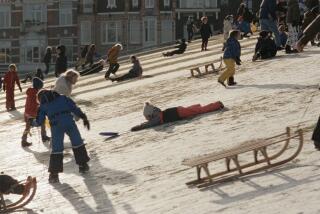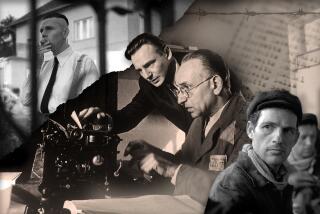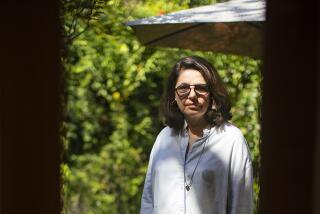A vengeance born of pain
- Share via
In 1904-07, the Hereros and other natives of German Southwest Africa revolted against their colonial masters. The Germans brought in Gen. Lothar von Trotha, who, as Thomas Pynchon dryly recounts in his novel “V.,” had demonstrated “a certain expertise in suppressing pigmented populations.” Von Trotha ordered the extermination of every Herero man, woman and child his troops could find. He “is reckoned to have done away with about 60,000 people,” Pynchon says. “This is only 1 percent of 6 million, but still pretty good.”
Such atrocities, which prefigure those of the Nazis and of the apartheid regime South African writer Andre Brink spent much of his career protesting against, are the background for Brink’s latest novel, “The Other Side of Silence.” The heroine, Hanna X, arrives in the colony in 1902 aboard one of the ships that supplied single German women to its sex-starved soldiers, prospectors and farmers. An orphan, intelligent but plain, beaten down by a childhood of abuse and by housemaid jobs that amounted to indentured servitude, Hanna believes she has nothing to lose by emigrating.
Landing at the port of Swakopmund, she and 108 other women are put on a train for the four-day journey to the colonial capital, Windhoek. Also aboard are hundreds of men, randy and drunk. The result is “a seething and brawling sleepless rage in which women were tried out and passed on and exchanged or reclaimed among battling suitors.... Invariably, however, some of the women would remain unclaimed. And these ... found unworthy by even the most disreputable of men, were candidates for Frauenstein.”
Hanna is one of the rejects bound for the castle-like desert outpost, after she maims a German army officer who attempts to rape her, and he, in turn, subjects her to some of the tortures he and his men developed for use on blacks. Horribly mutilated, her tongue cut out, Hanna is dumped into an oxcart bound for Frauenstein, “the prison, the nunnery, the brothel” for those condemned to spend the rest of their lives there.
Hanna falls off the cart, hoping to die, but is rescued by members of the Nama tribe, who teach her folk tales and nurse her to health. They take her to Frauenstein, where the authorities jump to the conclusion that these black people -- who else? -- must have inflicted her injuries. Soldiers later destroy the Nama village, and mute Hanna sinks into her silence, rousing herself only to do chores and to care for Katja, a teenage girl orphaned by the war.
Four years go by. Then a detachment of German troops stops at Frauenstein, and the nunnery shifts into its brothel mode. Brandy is brought up from the cellars, and, as on the immigrant train, a general orgy ensues. An officer begins to rape and beat Katja, and Hanna, discovering at last the power of hate, “giving direction and meaning to her whole life,” smashes his head in.
Hanna and Katja escape and form a ragtag little army of vengeful women and natives, bent on nothing less than the destruction of “the whole German Reich.”
Brink cannily alternates the scenes in Africa with scenes from Hanna’s early life in Bremen. He shows how colonial cruelties are a seamless outgrowth of cruelties at home, fostered by military arrogance, hypocritical religion and the subordination of women. He creates a first-person narrator who searches for Hanna X in century-old records and ponders, in an explicitly feminist way, the development of her consciousness. As he did in “Devil’s Valley,” Brink blends history with invention and African myth. Ghosts prowl Frauenstein and accompany Hanna’s army; rain falls when shamans will it so.
Brink’s last novel, “The Rights of Desire,” had an elderly hero and an autumnal tone, but there’s nothing geriatric about “The Other Side of Silence,” in which Hanna, who learned strategy by playing chess with one of her less odious employers in Bremen, is forced by Katja, who hasn’t given up on the possibility of loving a man, to face the moral dilemma of every revolutionary: How can she fight evil without becoming evil herself? What should she do if, against all odds, she reaches Windhoek and confronts the German officer again? This bloody fable, rooted in bloody reality, is one of Brink’s most powerful works.
More to Read
Sign up for our Book Club newsletter
Get the latest news, events and more from the Los Angeles Times Book Club, and help us get L.A. reading and talking.
You may occasionally receive promotional content from the Los Angeles Times.








